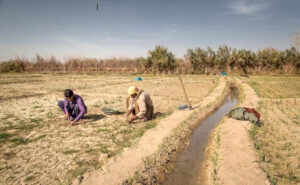KABUL (SW) – Salam Watandar’s findings from a survey conducted in Kabul indicate that many young people have become unemployed in the past nearly three years, facing economic hardships.
Salam Watandar interviewed 30 unemployed youths, including 11 women and 19 men with bachelor’s degrees. Among them, 18 individuals stated they lost their jobs after the collapse of the republican regime in Afghanistan.
The survey, conducted among individuals aged 15 to 35, found that 12 out of the 30 interviewees reported that they have been unable to find a job after completing their education.
Rohid Ahmad Khairkhah, and Emran Safi, each with over 5 years of work experience in various government and private sector positions, are now suffering from unemployment. They claim to have lost their jobs after the de-facto government took power in the country.
“In both government and private sectors, I have worked as an administrative officer, administrative manager, and executive manager since 2011. We were all employed until the republic government was in power, but after its collapse, those of us who were in high-ranking positions in the government were all left unemployed and were dismissed from our duties,” said Khairkhah.
Safi also added: “I myself have been unemployed for two years since the transition, and the reason for my unemployment is that most domestic and international institutions and companies halted their activities after the changes. Most of the places where I worked and where job opportunities were provided for people disappeared and ceased operation.”
Among the 18 interviewed youths who have become unemployed, 7 of them are women. Since the Islamic Emirate banned women and girls from working in most government agencies and international organizations, many women have lost their jobs and faced economic hardships.
Tamana Hashemi and Safiya Rahimi, two residents of Kabul who previously worked in international institutions, say that they are now struggling to make ends meet due to unemployment.
Tamana Hashemi expressed, “I have a degree in English literature and two years of teaching experience in a school. I also worked in an institution. However, after the recent changes in the country, I became unemployed and could not find a job anymore.”
Safiya Rahimi, also said: “I used to work at the WFP (UN World Food Programme) until last year. When the ban on women working in government and institutions was imposed, many women, including myself, became unemployed.”
Young individuals who have completed their education and have been unable to find employment express frustration at their unsuccessful attempts to secure jobs in both government and private sectors.
Abdul Wahab Rahmani, who is graduated from agriculture department of one of the universities in Kabul, says that despite several attempts, he could not secure a job. “The problem lies within the government offices where nepotism is rampant. Even though I passed the exams successfully, they handed the positions to other individuals, often relatives. After that, I decided to make a plan and start my own business,” he explained.
Zekrullah Mashal, another resident of Kabul, also shares his experience: “I have a degree in law, but there are few opportunities in Afghanistan. Without connections, it is challenging to secure a position in government offices. I have been unemployed for three years now.”
According to statistics from the National Statistics and Information Authority (NSIA) of the Islamic Emirate provided to Salam Watandar, there are 17 million young individuals in Afghanistan who are eligible for employment, with over 10 million of them currently facing unemployment.
Officials at the National Union of Workers and Labourers of Afghanistan emphasize that “employment is a fundamental right of workers”, and the government should provide the necessary conditions for their employment.
Liyaqat Adel, the head of this union, told Salam Watandar that political upheavals in Afghanistan, exploitation of labour rights by employers, widespread corruption in government agencies, and the prevalence of the COVID-19 pandemic are among the factors contributing to the youth unemployment crisis in Afghanistan.
“As for the youth, I can say that while accurate statistics on the number of unemployed individuals in recent years are not available, the mass exodus of young people from the country and countless migrations indicate that youth unemployment rates have soared,” he added.
On the other hand, sociologists argue that unemployment poses not only a psychological threat for individuals but also a direct threat to society. When young people cannot find employment, the future of that society appears bleak.
Zia Shams, a sociologist, says: “Afghan society is grappling with such threats, and therefore, it lacks a suitable movement towards stability. Youth unemployment constitutes a plague and an impediment to civilization in various aspects. If we wish to safeguard our society from this predicament, we need a dynamic society, with multidimensional dynamics that reflect societal movement, discernible activity, and honest, capable, and hardworking institutions.”
Meanwhile, Samiullah Ebrahimi, the spokesperson for the Ministry of Labour and Social Affairs, tells Salam Watandar that with the establishment of the Islamic Emirate, the ministry has been able to issue work licenses to nearly 300,000 individuals.
Ebrahimi adds, “With the establishment of the Islamic Emirate, efforts have been made to provide employment opportunities to workers. Therefore, we have opened up job vacancies in vacant positions in government offices and made them available to the public and young people. As an example, in the current year alone, more than 110,000 people have received work permits.”
The spokesperson for the Ministry of Labour and Social Affairs also said that to create a conducive environment for the activities of sectors and factories, and to reduce the unemployment rate, a national labour conference will be held in the near future.
“Alongside the private sector, with the cooperation of the international labour organization, we can create better job opportunities for people, provide facilities, and make progress in legislative documents. All of these are plans that can reduce the unemployment rate in society.”
Although the unemployment rate was already high in Afghanistan, after the collapse of the republic and the suspension of most development projects by the international community, and the restrictions imposed on women’s work, many more have been added to the ranks of the unemployed.
Youth unemployment and the financial hardship of families have prompted hundreds of thousands of citizens to migrate annually to neighboring countries and the region in search of job opportunities.






